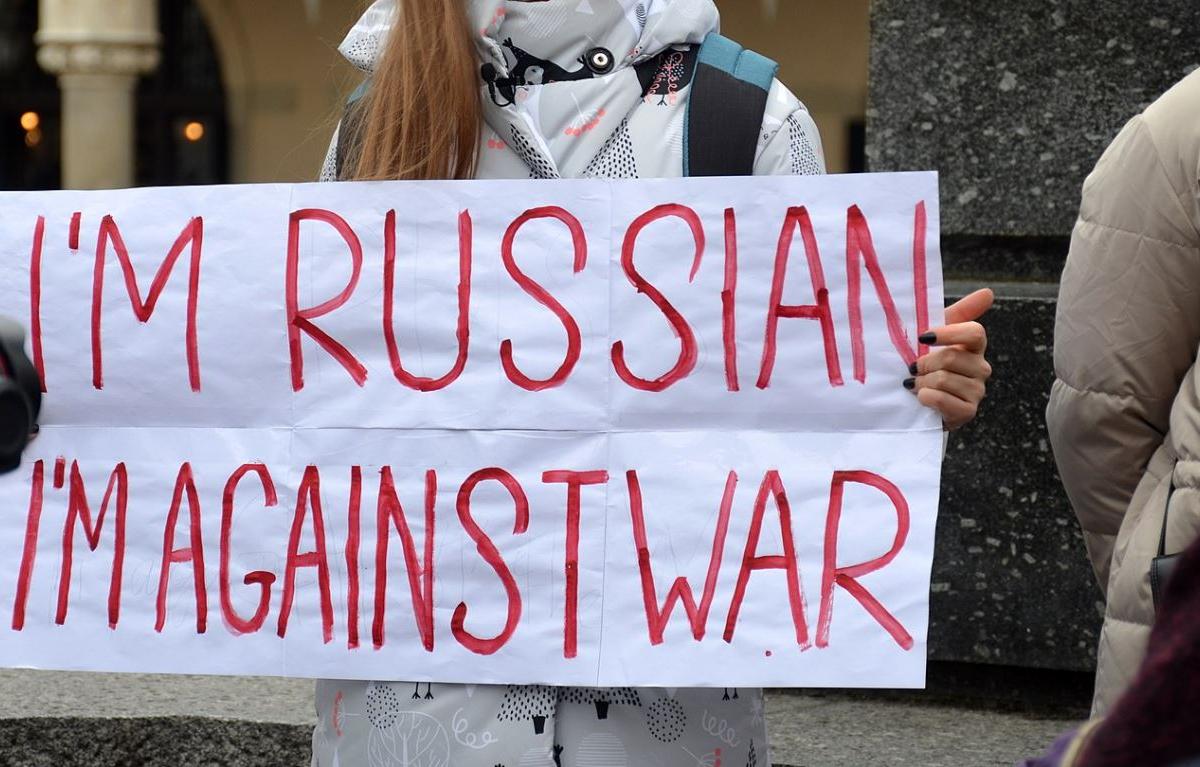
Since at least the beginning of the Russo-Ukrainian war, we have witnessed many efforts to pin blame for the conflict not only on the Russian regime, but on virtually all of the Russian people as well. Back in June, for example, the Western media was already in habit of publishing long, detailed articles explaining why ordinary Russians are morally culpable for the war in Ukraine.
Consider this piece in Canada’s National Post which approvingly quotes former Russian pollster Elena Koneva who concludes ordinary Russians are “100-per-cent responsible” for the war. On what does she base this? She bases it on polling showing that barely a majority—53 percent—of Russians back the war. The National Post article is hardly unique. A google search of “are the Russian people responsible for the war” returns plenty of incoherent takes on how all Russians are morally at fault for what the local regime does.
The most enthusiastic backers of this blame-every-Russian philosophy can perhaps be found in Eastern Europe where the local regimes often benefit from stoking nationalist fervor against the past crimes of Russian and Soviet regimes.
Politicians from the Baltics have used this philosophy in recent weeks to call for the EU to close its borders to Russians. Last week, for example, Lithuanian Interior Minister Agne Bilotaite insisted that since a majority of Russians (presumably) support the war, it is “unacceptable” that these people [i.e., ordinary private citizens] can “freely travel around the world.”
In perhaps the most blatantly incoherent example of this philosophy we’ve seen, Estonia’s Prime Miniters Kaja Kallas has flatly stated “Every citizen is responsible for the actions of their state, and citizens of Russia are no exception.”
Kallas’s claim, however, is frankly absurd. It is most certainly not the case that every citizen—or even most citizens are responsible for the actions of their regimes. We can easily see this if we look to a variety of other regimes. For example, if we use Kallas’s logic, we must conclude that the Estonians themselves were personally responsible for everything the Soviet state did from1944 to the time Estonia seceded from the USSR in 1991. The Estonians were Soviet citizens during this time. Were they all guilty of the invasion of Afghanistan and every other human rights violation hatched in Moscow? Similarly, by this logic, lowly Okinawan fishermen were responsible for the Rape of Nanking. The poorest British chimney sweep was responsible for the Boer War, and Saint Paul (a Roman citizen) was responsible for the Jewish-Roman war of 66 AD. Only the most fanatical ideologue would agree these statement are true.
Of course, some might then claim that collective guilt only applies in democracies. This claim doesn’t hold up either. By this logic, all Germans were responsible for the Nazi regime’s actions during the 1930s, whether or not they voted for the National Socialists in 1933. Moreover, by this way of thinking, the poorest Appalachian coal miners were responsible for the US bombing of Cambodia, and even the most avid Thatcher-hater in Britain was responsible for the UK’s operations in the Falkland War. Moreover, in many democracies, the ruling party is elected with only bare majority of the voters—and the voters who elect the rulings party are themselves a clear minority of the overall population. In 2016, for example, only 19 percent of the US population voted for Donald Trump. How this works out to holding a majority of the population “responsible” for the Trump administration’s policies is not at all clear.
Another major reason for the lack of guilt among ordinary citizens of regime is the fact that most regimes—whether democracy or autocracy—hide immense amounts of information from their own people. This is especially the case of foreign policy in which regimes routinely withhold the facts from the taxpayers under the guise of state secrecy for purposes of “national defense.” Are Americans guilty of whatever the CIA is up to this week? How are Americans to even know in real time what their regime is doing? The fact is they don’t know, and few of them even have the free time to keep track of the details. (God forbid people choose to spend their free time bonding with their children and earning a living.) But even for those who attempt to seek out such information, the state has such a firm grip on media and public education that becoming truly well informed is a daunting task indeed.
Kallas’s claims do make sense in the twisted logic of modern nationalism, however. The nationalist ideology—perhaps history’s most successful ideology—conflates the interests of the regime with the interests of ordinary people. It attempts to erase the distinction between the exploited masses—those who are taxed to support the regime—and the regime itself. Once these two groups could be merged, however, we were then told the regime itself was simply carrying out the so-called volonté générale or national will. This was a legacy of the rise of nationalism that came in wake of the French Revolution and solidified our modern notions of citizenship and national guilt.
But it was not always this way. As Martin Van Creveld notes, the regime under which one lived was not always an important part of how one was viewed by other or even by himself. Eventually, though, “citizenship” became psychologically important and shaped modern views of how foreign citizens are to be viewed in time of war. Van Creveld writes:
In day-to-day life, the question of whether one was a citizen of this state or that became one of the most important aspects of any individual’s existence besides the biological facts of race, age, and sex. …As late as the end of the ancien régime, Lawrence Sterne, author of A Sentimental Journey, was able to travel from Britain to France even though they were at war with each other; and, having arrived there, to be received with every sign of honor in the social circles to which he belonged. However, the nineteenth century put an end to such civilities…
All states during wartime, and some during peacetime too, imposed restrictions on whom their citizens were and were not allowed to marry, while hostilities lasted, enemy nationals were likely to be interned and have their property confiscated.”
“Citizenship,” however is just a legal and ideological fiction and hardly makes a taxpayer an integral part of the state machine. Yet, the novel nationalist ideological innovations in the 19th century led many to conclude that the citizens of an enemy state were also themselves the enemy.
This way of thinking was expanded in the 20th century to the point it enabled any countless number of war crimes and actions against non-combatants. Historically, the same sort of thinking has been used to justify terror bombing (such as the firebombing of Dresden) and the starvation blockade inflicted on Germany in the First World War. The fact that such indiscriminately deadly policies can be thought morally justified at all relies on a general feeling that the common people in foreign states are somehow personally responsible for the crimes of their governments. Thus, to burn to death 100,000 civilians in one night—as happened with the firebombing of Tokyo—can be written off as a matter of foreigners “bringing it on themselves.”
The idea certainly continues today and lives on in the idea of “little Eichmanns” forwarded by some theorists on the Left. This justifies various forms of terrorism on the notion that even seemingly harmless people are ultimately enablers of the worst crimes committed by the states under which they live. Thus, as Ward Connerly contended in his book On the Justice of Roosting Chickens, the office workers in the Twin Towers were only “civilians of a sort” and that thanks to the bombings, they suffered a “penalty befitting their participation” in the American war machine.
This position is ultimately indistinguishable from Kallas’s idea that “Every citizen is responsible for the actions of their state.” It is a very dangerous idea indeed and nothing better than a regrettable legacy of the barbaric twentieth century.






